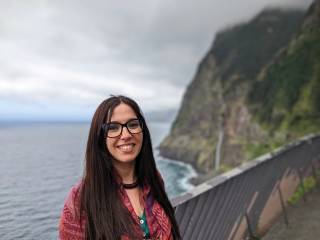Spotlight on Dr Maria Perez-Ortiz - Senior Research Fellow at UCL Computer Science

My role involves mostly research in artificial intelligence, part of which covers applications in the social and environmental domain. Recently, I have been developing a very exciting new MSc program on Artificial Intelligence for Sustainable Development that will start in October 2022.
How long have you been at UCL and what was your previous role?
Close to four years now! Before that, I was a postdoctoral research associate at the Department of Computer Science & Technology at the University of Cambridge, doing research on how to model human visual perception with artificial intelligence and how to adapt the technology around us for those with visual impairments.
Tell us about something you’re working on at UCL that is supporting the SDGs
I recently developed and taught a module at UCL that focused on introducing computer science students to topics related to sustainability and the SDGs. The module aims to give students the critical tools that allow them to analyse the impact that different technologies have on our society, environment and economy.
Technology, and more specifically artificial intelligence, can enable many SDGs, such as climate action (for example, through smart agriculture tools, optimisation of the energy grid, better climate simulations, etc.), but at the same time it could also inhibit our progress towards many other SDGs (for example, increasing inequality or allowing for automatised large-scale bias).
Beyond work, which of your everyday activities contributes most to one or more of the SDGs?
Perhaps gender equality, as I volunteer sometimes with different associations and schools (mostly in Spain where I am from!) to support young girls who want to go into science and technology careers.
And what do you do that has the most detrimental impact on the Goals?
I love that you ask this question! I would say my carbon footprint due to flights. However, I try to counter this with a mostly low-carbon footprint diet.
In your opinion, which of the SDGs is the most important for humanity to address?
Climate action and conservation of life in land and oceans, because of the urgency of these goals. However, the SDGs are obviously deeply interconnected. So in my view one of the most crucial ways to address climate action is indirectly, through education.
We urgently need to add topics related to sustainable development in our curriculums, almost independently of the subject area or level of education. I think education is what could truly finally lead to that ripple effect that we have been hoping for in terms of climate action.
If there was an 18th Goal, what should it be?
Cultural heritage preservation. Development or progress should also be about preserving what’s already there (our ecosystems, our cultural heritage, etc.).
If you could bring in one law or societal shift to help the UK address the SDGs, what would it be?
I think progress towards the SDGs should be driven to a large degree by universities, which means we need to start evaluating our research and educational systems in connection with the SDGs. I believe some ranking systems already exist that provide scores for the impact of the research of universities. Similarly, social and environmental impact is starting to be a main point of evaluation for research grants, which is a great step in that direction.
What is the biggest challenge to the world achieving the Goals by 2030?
The lack of governance of technology, which could, in my view, lead to unforeseeable consequences in terms of impact on the SDGs.
What would it surprise people to know about you?
I suffer from endometriosis, a disorder that creates chronic pain and affects only women (estimated at around 10% of the female population), which is classified as one of the most painful conditions according to the NHS. Thankfully, I have found after 17 years the way to manage the symptoms, but I try to take every opportunity that I have to talk about it and raise awareness, because it affects the lives and careers of so many women and is severely under researched – like many other disorders that affect only women.
 Close
Close

